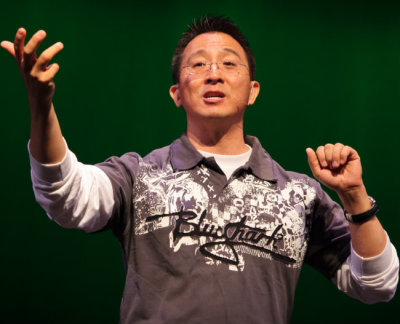Christians With Same-Sex Attractions Weigh in on Homosexuality-Bible Debate
Editor's Note: This is the final part in a three-part series featuring both sides of the debate on the Bible and homosexuality. The series began with an interview with Matthew Vines, and was followed by a report featuring responses from evangelical theologians. This final part features guest viewpoints and testimonies from Christians who have chosen to not engage in homosexuality and those who don't believe a gay lifestyle conflicts with the Bible.
Christopher Yuan – Placing My Identity in Christ, Not My Sexuality

Unlike Matthew Vines, I was not raised in a Christian home and believed homosexual, romantic relationships were not sinful. I became aware of my attractions toward other men when I was nine but hid them until I came out in my early twenties while in graduate school pursuing a doctorate in dentistry. My mother was devastated but through this incident, she became a Christian. Although her initial response was rejection, after coming to Christ she could do nothing other than love her gay son.
After many years of running from God and rebelling against my parents, I was incarcerated for drug dealing and received the news that I was HIV+. I found a Bible in the trash can and began reading it. I confided with a prison chaplain who told me that the Bible does not condemn homosexuality, and he gave me a book by gay historian, John Boswell.
Like Vines, I too wanted to reconcile faith with sexuality. With that book in one hand and the Bible in the other, I had every reason to accept Boswell's assertions to find biblical justification for homosexuality. But surprisingly, I felt Boswell's interpretations did not line up with the plain reading of Scripture. So I turned to the Bible alone and read every verse looking for positive support for romantic, homosexual relationships. I couldn't find any.
What changed my mind wasn't the six "clobber passages" which mention homosexuality. It was realizing that I had placed my identity and focus on the wrong things – my sexuality and pursuing a same-sex, romantic relationship. But God calls Christians to put their identity in Jesus Christ alone. God says, "Be holy, for I am holy." I needed to pursue a life of holiness, not heterosexuality or homosexuality.
After my release from prison, I attended Moody Bible Institute receiving a degree in the Bible with an emphasis in biblical languages and also completed a masters in biblical exegesis from Wheaton College Graduate School for a total of four years of biblical Hebrew and four years of biblical Greek. I am now an adjunct instructor of the Bible at Moody Bible Institute while pursuing a doctorate of ministry at Bethel Seminary (St. Paul, Minn.).
Exegesis (literally "to draw out") is the critical interpretation of a text requiring knowledge of the original language in which a text is written. Many begin with a presumption and superimpose their predetermined conclusion upon a text. This is eisegesis ("to draw in") which is the opposite of exegesis. Matthew Vines' entire argument hinges upon his presumption that the Bible doesn't specifically address loving, same-sex relationships. Although there is no direct mention, the Bible does condemn it in its universal prohibition against all homosexual sex and romantic relationships.
In Romans 1:26-27, Paul draws from well-known Greek philosophers and Hellenistic Jewish authors to universally condemn all homosexual sex and romantic relationships. "Unnatural" or para fusin is used by Plato, Philo and Josephus to refer to homosexual sex per se, not merely lustful, homosexual relationships. In addition, "nature" or fusis is found in Wisdom of Solomon, 3 Maccabees and 4 Maccabees. In each occurrence, fusis refers to nature (in general), a characteristic or origin – never as "customs" as Vines asserts.
Most importantly is Paul's appropriation of the Levitical condemnation against all homosexual sex and relationships in 1 Corinthians 6:9. Paul created a word "arsenokoitai" directly from Leviticus 18:22 and 20:13 in the Septuagint (Greek translation of the Hebrew Bible). The first half of Leviticus 20:13 from the Septuagint reads: "kai hos an koimethe meta arsenos koiten gynaikos." Any good Hellenistic Jew familiar with the Torah and the Septuagint would make an unmistakable connection between "arsenokoitai" and the universal condemnation of all homosexual sex and romantic relationships found in Leviticus 18:22 and 20:13.
Even if Vines' presumption is true that the Bible doesn't specifically address loving, same-sex relationships, the absence of evidence is not evidence to the affirmative.
Finally singleness, voluntary or involuntarily, is not a curse. Paul states in 1 Corinthians 7 that singleness is good. This does not contradict Genesis 2:18, "It is good for a man not to be alone." New Testament scholar Barry Danylak states, "When Genesis 2:18 affirms that it is not good to live alone, marriage is given as a provision. But this does not imply that marriage was designed to be the sole provision for one's aloneness." Singles can develop deeper (but non-romantic) relationships which would otherwise be more difficult if married. Jesus, who was single, teaches in Mark 3:31-35 that family in the New Covenant extends beyond our immediate biological family.
Voluntary or involuntary singleness is not the same as being alone, nor is it "incalculable pain and suffering" as Vines states. Paul exhorts believers in 1 Corinthians 7 to find contentment in whatever situation we find ourselves in – whether voluntarily or involuntarily. Contentment should never be predicated upon another person, but solely in Christ Jesus and a life fully surrendered to Him.
Christopher Yuan (www.christopheryuan.com) is author of "Out of a Far Country: A Gay Son's Journey to God, A Broken Mother's Search for Hope." Yuan, who has a heart for those working through issues of sexuality and those living with HIV/AIDS, also teaches at Moody Bible Institute, speaks locally and internationally to youth, on college campuses, in churches and in prisons.
Tom Brock – A Pastor's Struggle With Same-Sex Attraction

I have struggled with homosexual temptation most of my life. By the grace of God I have always been celibate but the struggle for me has been intense. Sadly, the battle was also with my own denomination. In my 22 years as a pastor in the Evangelical Lutheran Church in America I spoke at church conventions for the Biblical standard of celibacy for those with same-sex attraction. Sadly, in 2009 the ELCA adopted a more liberal view and began ordaining practicing homosexuals. I have left the ELCA but I continue in my television ministry to uphold the truth that homosexual behavior is sin, and the fact that I struggle with this temptation does not give me license to practice the behavior.
This summer I testified before a hearing at the convention of the Presbyterian Church (U.S.A.) as they debated whether to change the definition of marriage to include homosexual couples. I explained that I am a person who struggles with same-sex attraction but the last thing I want to see is the Church endorse a behavior that hurts people in this life and which excludes them from the Kingdom in the next (I Corinthian 6:9-11).
I stated: "Is it not arrogant to think that we are somehow more enlightened than all the Christians who came before us?" I believe it is safest to interpret Scripture the way Christians have understood it for 2,000 years and the solid testimony of church history is against homosexual behavior. The Biblical interpretation that has led some denominations astray – notably the ELCA, Presbyterian Church USA, the Episcopal Church in America, and the United Church of Christ – maintains that the Bible does not condemn homosexual behavior per se, but only promiscuous homosexual behavior. As much as part of me – my flesh – would like to believe I can legitimately engage in homosexual behavior, the Bible remains a permanent obstacle. An objective reading of Leviticus 18:22, 20:13, Deuteronomy 22:5, Romans 1:26-27, I Corinthians 6:9-11, I Timothy 1:8-10, Jude 6,7 makes clear that the Bible's condemnation of homosexual behavior is a blanket one. There is never the added caveat: But it is okay if you love each other.
At the Presbyterian convention, one pastor testified that the denomination should allow her to marry lesbians in her congregation because "If I don't I will hurt them." I responded, "No, to encourage them to engage in a behavior which will rob them of salvation, that is what will hurt them."
I was interviewed on Minneapolis radio about my struggle and the interviewer asked, "Pastor Brock, why don't you just go with this orientation as who you are." I responded, "I'm glad I didn't. I'd be dead. Many men my age who went into this lifestyle are dead." Some liberal Lutheran bishops I know believe they are being loving by affirming homosexual behavior. The truth is they are hurting people. As one old Lutheran pastor said, "They are nicing people right into hell." I can't tell you how grievous it was for me with my struggle to hear bishops endorse something that I knew was evil.
So what does one do if one suffers from same-sex attraction? I believe the answer is: fight. Nowhere are we told the Christian life will be easy. I once heard someone say "But God would never ask you to deny something so central to your make-up as homosexuality." I thought, "Why not?" If we believe in the doctrine of original sin – that we are all born sinners because of Adam's fall (Romans 5) – then indeed every Christian is called to battle the sin that is so central to our make-up. One often hears "But I didn't choose this." I can relate. I never consciously asked to have these temptations. But most alcoholics do not wake up one morning and say "I think I'll have a drinking problem." Kleptomaniacs do not say "I think I'll have a problem with shoplifting." We may not choose our temptations in life, but we do choose what we do with our temptations. To be tempted is not sin. Jesus was tempted in Matthew 4. What we do with temptation shows whether we are endeavoring to follow Christ. And, praise God, even if we do fall under temptation, there is forgiveness when we repent and turn to Christ.
What will help people who struggle with same-sex attraction? Of course, regular prayer, Bible reading and being in a good church, a church that has not compromised on this issue. But for most people struggling with same-sex attraction, the crucial key is accountability. I have been part of a Christian support group for those who struggle with same-sex attraction. If you google "Exodus International" you will most likely find a group in your area where you can join other Christians who have this struggle. Also very important for me are the weekly phone calls I make to my accountability partner who helps keep me on the straight and narrow.
Lastly, where does homosexuality come from? Is it nature (in the genes) or nurture (in one's upbringing)? I lean toward the latter but ultimately it does not matter. Wherever it comes from, we are called upon to follow Christ and say "no" to it. As our Lord Himself stated: "If anyone would come after me, let him deny himself and take up his cross daily and follow me" (Luke 9:23).
Tom Brock was born in Omaha, Neb., and graduated from Bethel College in St. Paul, Minn., with a degree in Biblical and Theological Studies. He received a Masters of Divinity degree from Luther Seminary in St. Paul, Minn. He was ordained a Lutheran pastor in 1979 and has served congregations in Florida and Minnesota. He served on the board of reform groups attempting to bring Biblical renewal to the Evangelical Lutheran Church in America before he left that denomination over their position on issues such as abortion, homosexuality and universalism. Pastor Brock for 24 years has had a television ministry which can currently be seen on DirecTV on channel 367 (World Harvest Television) Sundays at 8:30 Central Time. He also does guest preaching at churches. Pastor Brock is 59 years old and has been single his whole life. His TV program can also be viewed at pastorsstudy.org.
Justin Lee – Executive Director of The Gay Christian Network

When I hit puberty and all my male friends began to "notice" girls, I didn't. Instead, I began to notice guys.
I didn't understand why this was happening. I was a committed Christian with a strong relationship with Jesus, wonderful relationships with both parents, and no history of abuse or trauma. How could someone like me have these feelings?
Confused, I prayed about it, focused on my spiritual walk, and trusted God to heal me and give me attractions to women. When I found out about so-called "ex-gay" ministries, I contacted them for support and advice. But even after many years of prayer, and with all my faith in God, my male attractions never went away, nor did female attractions ever develop.
This is, in fact, an incredibly common story. Most same-sex attracted Christians don't ever become opposite-sex attracted, even with faith, prayer, and therapy. When ex-gay leader Alan Chambers recently said that "99.9%" of people in his ministry didn't become straight, many Christians were shocked. Those of us who have been through these groups weren't.





















